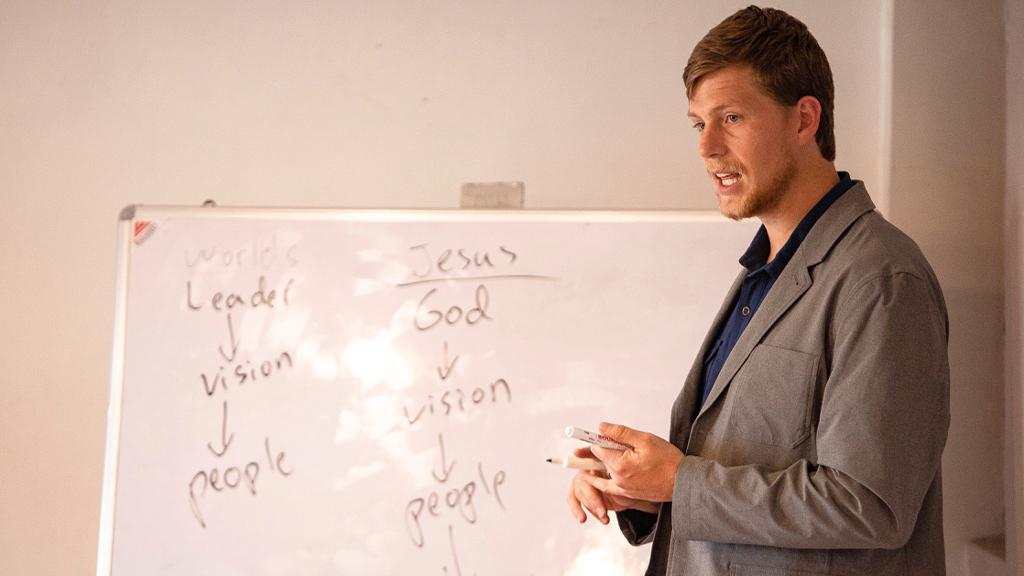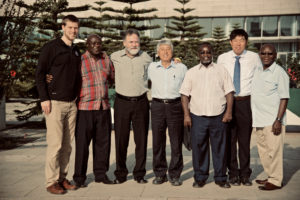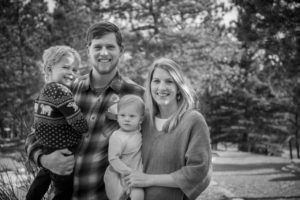Equipping All Churches

How CJ Davison is using his seminary degree to help churches around the world.
by Ashley G. Emmert
CJ Davison wants to equip the global church with leadership and Bible training—and he knows how deeply it’s needed. After graduating from Virginia Tech with a degree in Public and Urban Affairs in 2010, CJ spent three years overseas, first working with Samaritan’s Purse in Ethiopia and Haiti, and then serving as a missionary alongside his wife in Kenya, working in a HIV/AIDs ministry. “While overseas,” CJ explains, “it became increasingly clear to me that one of the biggest needs globally was biblical teaching and leadership training. There was a big difference between churches with well-trained leaders and the churches without well-trained leaders. The years in Kenya, especially, showed me how that training was essential to engaging in the global church.”
While he was in Kenya, part of CJ’s role was working with local staff and church pastors, and creating Bible curriculum and leadership training. CJ says his work on these training materials gave him a passion for the training and equipping needs in the global church. “This was a huge need, and a way I could engage meaningfully with these churches. But I felt like I needed to be better equipped in order to answer the need I saw.” After two years in Kenya, CJ turned to Denver Seminary—specifically, the MA in Leadership program. “My wife and I moved straight to Colorado for seminary,” he explains. “I felt like the Lord was calling us to Denver. The program was attractive to me in what it offered in the mix of leadership and theology. And we knew Colorado would be a good place for me and my wife to start a family and get more into ministry.”

While attending Denver Seminary part-time, CJ began working at Leadership International, an organization that specializes in training and equipping pastors in underserved parts of the globe. CJ first learned about Leadership International from his friend and mentor, Leadership International founder Larry Warren, whom he met in Kenya.
CJ worked at Leadership International throughout most of his time at Denver Seminary, and continues to work with the organization now. He believes Denver gave him the best tools possible to do this work. “Denver Seminary has a healthy, humble character to it,” he explains. “Every seminary has pros and cons, but I felt like the staff and people they attract have an incredibly healthy character and perspective of the gospel. I’m attracted to those kinds of professors. They’re the kinds of people I see myself working with in ministry. The diversity of the staff within the realm of orthodox evangelicalism helped me know and appreciate the global church better. The leadership program had an incredible blend of practical leadership and theology, and the practical leadership especially helped me feel equipped.”
CJ goes on to say that the practical training he got from Denver Seminary was an incredibly important part of what made his degree so effective in this field.
“There are only a fraction of overseas churches and pastors who are desperate for Greek and Hebrew training. The felt needs are, ‘How do I teach on Sundays, how do I lead my staff, how do I serve my community?’ The church has social and economic needs, but it’s also growing quickly. They’re asking how to grow and manage a growing church. Denver had a practical approach.”
Another aspect of Denver Seminary that heavily influenced CJ’s work with Leadership International was the Training and Mentoring program. “It was helpful for me spiritually and developmentally. There are several former mentors with whom I’m still in touch. Professionally, it gave us a vision for our Leadership International program to build mentoring into our program. We’ve built a global coaching website—that’s a first step.”
Now the US Director of Leadership International, CJ travels and meets with leaders across the globe, saying his heart for empowering the global underserved church has only grown. “I had the blessing of going to seminary, and many do in the western world, but statistics show that most church leaders won’t get that training around the world.”
CJ says Leadership International’s approach to training is simple: local first. “Our core team is remote; most of our team is overseas. We set up locally run training programs, either run by local staff or by local organizations that want to do training with us. We equip leaders with training programs and service projects. The classes last one to two years. It’s in-classroom training, in the evenings for a few hours every week. We have Bible training and leadership training. We’ve got about 1,500 students going through training right now.” CJ explains that the emphasis on empowering local pastors has been important since the founding of Leadership International in 2011. “Our team was founded by an American, a Korean, a Ghanaian, a Kenyan, and a Zimbabwean. It’s always been an international organization.”
One aspect that CJ appreciates is the way his work combines Biblical training with active service for the community. “We do service projects in the communities where we’re working. We’ve built daycares, water wells, and right now we’re building a school in Kenya in one of the slums serving orphans and vulnerable children. We call it leadership in action—tangible expressions of the gospel.”
CJ emphasizes the importance of not simply being a talking head when doing work overseas.
“You have to show people the gospel tangibly, especially in communities where there’s significant need, while also teaching the Word of God. It’s the same model that Jesus used—love your neighbor as yourself and go and make disciples to all nations through teaching. It’s a great commission and great commandment.”
When asked what kind of impact he’s seen from the work Leadership International is doing, CJ points back to the global church. “Leaders who have gone through this training have new confidence in their abilities to shepherd and teach the Word. We’re seeing these leaders impact churches and communities with the gospel. We funded a program in Ethiopia, and they were so inspired that they raised thousands of dollars to run their own training center. We’re seeing a bigger heart for community impact in general. Serving the vulnerable and needy, the orphans and widows. We see that as a tangible expression of leadership who are following Jesus. It’s about training them to be more impactful in their communities.”
At this point, CJ says they’re just scratching the surface. “There is such a huge need, globally. God’s heart is to make the bride of Christ beautiful and He calls leaders into a very sacred position to shepherd and steward. Until the church is perfect and holy, there is a lot to do. There are many other organizations like ours doing a great job, but this is an incredible need in the world.” But CJ feels far from hopeless, describing the challenges of oversaturated and under-saturated places as part of God’s design. “God’s economy operates in needs and gifts. We can meaningfully engage with the world in that way. We can pour out our blessing of education and knowledge. Lack of persecution has allowed us to do that. In these countries there is persecution that’s kept them from having that education. It’s our job to go in and provide it.”

CJ Davison has done campus ministry, disaster relief, HIV/AIDS ministry in Africa, local outreach in Colorado, and Biblical leadership training. He lives in Colorado with his wife and children, working with Leadership International to equip the underserved global church with training. He earned an MA in Leadership from Denver Seminary. He loves to read, write, and rest (preferably in nature).
